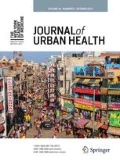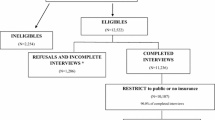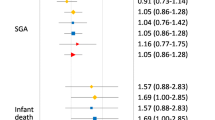Abstract
Housing instability is an understudied social condition that may be a severe stressor during pregnancy. Aims of this study are to identify correlates of housing instability and to explore the association between housing instability and birth weight among pregnant teens and young mothers. Participants included pregnant women ages 14–21 from seven community hospitals and health centers in New York City (N = 623). Data were collected via structured surveys during the second trimester of pregnancy (14 to 24 weeks gestation, M = 19.35, SD = 3.20). Birth weight was obtained through labor and delivery logs. Housing instability was operationalized as two or more moves within the past year. More than one in four (28.5 %) pregnant teens and young women in this sample reported housing instability. Women who reported housing instability were less likely to be enrolled in school, have parents as main source of financial support, live in a single-family home or apartment, or be food secure; they were more likely to smoke (all p < 0.05). After adjusting for important clinical, behavioral, and demographic factors typically associated with lower birth weight, housing instability remained a significant predictor of lower birth weight (B (SE) = −83.96(35.47), p = 0.018). Results highlight the importance of housing stability during pregnancy for infant health. Future interventions and policies should ensure that women are housing stable before, during, and after pregnancy.
Similar content being viewed by others
References
Child Health USA 2013; Available at: http://mchb.hrsa.gov/chusa13/dl/pdf/chusa13.pdf. US Department of Health and Human Services. Accessed September 30 2014.
Yang S, Platt RW, Kramer MS. Variation in child cognitive ability by week of gestation among healthy term births. Am J Epidemiol. 2010; 171(4): 399–406.
Dunkel Schetter C, Tanner L. Anxiety, depression and stress in pregnancy: implications for mothers, children, research, and practice. Curr Opin Psychiatry. 2012; 25(2): 141–148.
Johnson A, Meckstroth A. Ancillary services to support welfare to work. Washington DC U.S. Department of Health and Human Services 1998
Duchon LM, Weitzman BC, Shinn M. The relationship of residential instability to medical care utilization among poor mothers in New York City. Med Care. 1999; 37(12): 1282–1293.
Cohen R, Wardrip K. Should i stay Washington DC or should i go? Exploring the effects of housing instability and mobility on children Center for Housing Policy 2011
Robertson CT, Egelhof R, Hoke M. Get sick, get out: the medical causes of home mortgage foreclosures. Health Matrix Clevel. 2008; 18(1): 65–104.
Cutts DB, Meyers AF, Black MM, et al. US Housing insecurity and the health of very young children. Am J Public Health. 2011; 101(8): 1508–1514.
Kushel MB, Gupta R, Gee L, Haas JS. Housing instability and food insecurity as barriers to health care among low-income Americans. J Gen Intern Med. 2006; 21(1): 71–77.
Ziol-Guest KM, McKenna CC. Early childhood housing instability and school readiness. Child Dev. 2014; 85(1): 103–113.
Barrow SM, Herman DB, Cordova P, Struening EL. Mortality among homeless shelter residents in New York City. Am J Public Health. 1999; 89(4): 529–534.
Fischer PJ, Breakey WR. The epidemiology of alcohol, drug, and mental disorders among homeless persons. Am Psychol. 1991; 46(11): 1115–1128.
Suglia SF, Duarte CS, Sandel MT. Housing quality, housing instability, and maternal mental health. J Urban Health. 2011; 88(6): 1105–1116.
Stein JA, Lu MC, Gelberg L. Severity of homelessness and adverse birth outcomes. Health Psychol. 2000; 19(6): 524–534.
Allen J, Gamble J, Stapleton H, Kildea S. Does the way maternity care is provided affect maternal and neonatal outcomes for young women? A review of the research literature. Women Birth. 2012; 25: 54–63.
Ickovics J, Kershaw T, Westdahl C, et al. Group prenatal care and perinatal outcomes: a randomized controlled trial. Obstet Gynecol. 2007; 110: 330–339.
Wilcox AJ, Skjaerven R. Birth weight and perinatal mortality: the effect of gestational age. Am J Public Health. 1992; 82(3): 378–382.
Gans KM, Ross E, Barner CW, Wylie-Rosett J, McMurray J, Eaton C. REAP and WAVE: new tools to rapidly assess/discuss nutrition with patients. J Nutr Feb. 2003; 133(2): 556S–562S.
Black SE, Devereux PJ, Salvanes KG. From the cradle to the labor market? The effect of birth weight on adult outcomes. Q J Econ. 2007; 122(1): 409–439.
Matte TD, Bresnahan M, Begg MD, Susser E. Influence of variation in birth weight within normal range and within sibships on IQ at age 7 years: cohort study. Bmj. 2001; 323(7308): 310–314.
Richards M, Hardy R, Kuh D, Wadsworth MEJ. Birth weight and cognitive function in the British 1946 birth cohort: longitudinal population based study. BMJ 2001; 322: 199–203.
Oreopoulos P, Stabile M, Walld R, Roos LL. Short-, medium-, and long-term consequences of poor infant health. J Hum Resour. 2008; 43(1): 88–138.
Richards R, Merrill RM, Baksh L. Health behaviors and infant health outcomes in homeless pregnant women in the United States. Pediatrics. 2011; 128(3): 438–446.
Collins J Jr, Wambach J, David R, Rankin K. Women’s lifelong exposure to neighborhood poverty and low birth weight: a population-based study. Matern Child Health J. 2009; 13(3): 326–333.
Gavin AR. Mediators of adverse birth outcomes among socially disadvantaged women. J Women’s health (Larchmont, NY 2002). 2012; 21(6): 634–642.
de Valero Bernabé J, Soriano T, Albaladejo R, et al. Risk factors for low birth weight: a review. Eur J Obstet Gynecol Reprod Biol. 2004; 116(1): 3–15.
Smid M, Bourgois P, Auerswald CL. The challenge of pregnancy among homeless youth: reclaiming a lost opportunity. J Health Care Poor Underserved. 2010; 21(2 Suppl): 140–156.
Rodriguez C. NYC’s poverty rate goes up for 3rd straight year. WNYC News. September 20, 2012.
NYC Affordable Housing Resource Center. Available at: http://www.nyc.gov/html/housinginfo/html/apartments/apt_rental.shtml. Accessed April 28, 2013.
Brooks-Gunn J, Furstenberg FF Jr. Adolescent sexual behavior. Am Psychol. 1989; 44(2): 249–257.
Acknowledgments
Research was supported by grants from the National Institute of Mental Health (R01MH074399 and R01 MH07394) and a training grant (T32MH020031) that funded Dr. Earnshaw’s effort. The content is solely the responsibility of the authors and does not necessarily represent the official views of the National Institute of Mental Health or the National Institutes of Health.
Author information
Authors and Affiliations
Corresponding author
Rights and permissions
About this article
Cite this article
Carrion, B.V., Earnshaw, V.A., Kershaw, T. et al. Housing Instability and Birth Weight among Young Urban Mothers. J Urban Health 92, 1–9 (2015). https://doi.org/10.1007/s11524-014-9913-4
Published:
Issue Date:
DOI: https://doi.org/10.1007/s11524-014-9913-4




